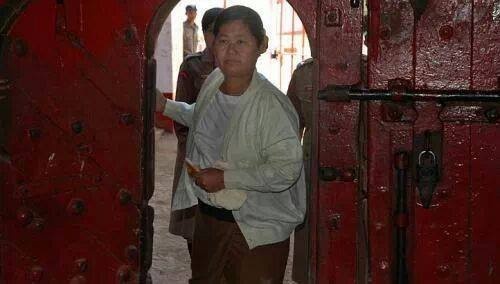Political prisoners should not be given any kind of special treatment over criminal inmates, as the constitution stipulates that all prisoners must be treated equally.
So says the Burmese government.
On Tuesday in parliament, Deputy Minister of Home Affairs Brig-Gen Kyaw Kyaw Tun said the term ‘political prisoner’ is unconstitutional as it contravenes the charter’s Article 347, which provides every person equal rights under the law.
The deputy home minister was speaking in response to a question raised in the lower house by opposition MP May Win Myint, who asked said the ministry to “clarify the definition of political prisoner”.
Speaking to DVB after the parliamentary session, May Win Myint said, “I raised the question to the ministry as I am a former political prisoner myself and I believe that a prisoner of conscience can in no way be the same as a criminal inmate. The deputy minister said the system that classified different statuses for inmates had been abolished.”
She said that Kyaw Kyaw Tun added that the Union Revolutionary Council government, of the former military dictator Gen. Ne Win, on 15 January 1964 issued an ordinance abolishing classification of different political prisoner statuses to ensure there is no privileged class of inmates in Burmese prisons.
“He [Kyaw Kyaw Tun] implied that political inmates should be treated the same as criminal inmates to avoid discrimination – I am saddened to hear that,” said May Win Myint.
Aung San Suu Kyi, the chairperson of May Win Myint’s party, the National League for Democracy, weighed in on behalf of her colleague after the parliamentary session when she told reporters that the deputy home minister’s explanation is inconsistent with government policy.
“Someone who lands in jail for political reasons is simply a political prisoner,” she said. “The government itself formed a committee to oversee the release of political prisoners. Now the deputy Home Affairs minister is rejecting the term. I think this is inconsistent.”
Meanwhile, a draft prison bill is being discussed in the upper house, with some MPs suggesting that the definition of ‘political prisoner’ be included in the bill alongside a reintroduction of the Inmate Classification system.
May Win Myint said she looks forward to joining that debate when it reaches the lower house.
According to political prisoner rights groups, 163 dissidents are currently detained in Burmese prisons, while another 442 are awaiting trial on a variety of charges.
“Political prisoners in Burma do not enjoy any advantages [over criminals],” said Ko Bo Kyi, speaking to DVB on Wednesday. “In fact, they are mostly crammed into tiny cells, just 8 x 12 feet. But things are not so bad at the moment. It depends on the political climate.”
[related]
Vani Sathisan, a Rangoon-based legal advisor to the International Commission of Jurists, said, “Unfairly jailing those who demand justice will not end the resistance to the government’s clampdown on human rights activists. People will continue their opposition and not place their trust in such a judicial system.
“The problem here is that the Myanmar government is swift to use the judicial system to throw its critics and opponents in jail but slow to use the judicial system to provide access to justice and prosecute those who violate human rights.”
She added: “The government is paying lip service to rule-of-law reforms as long as political prisoners, many of whom are prisoners of conscience, continue to languish behind bars.”



